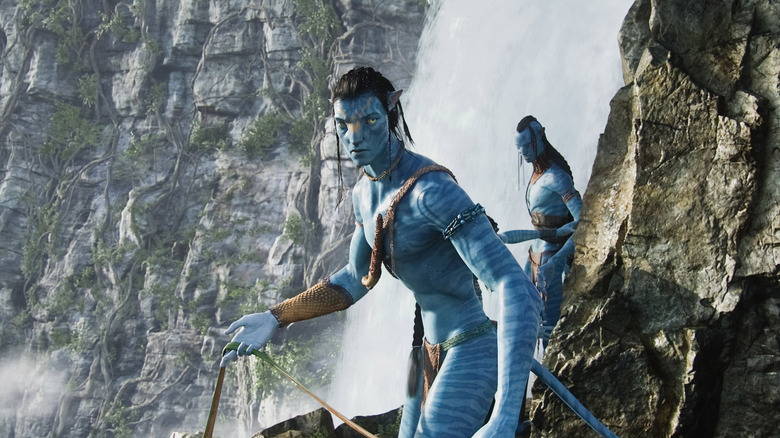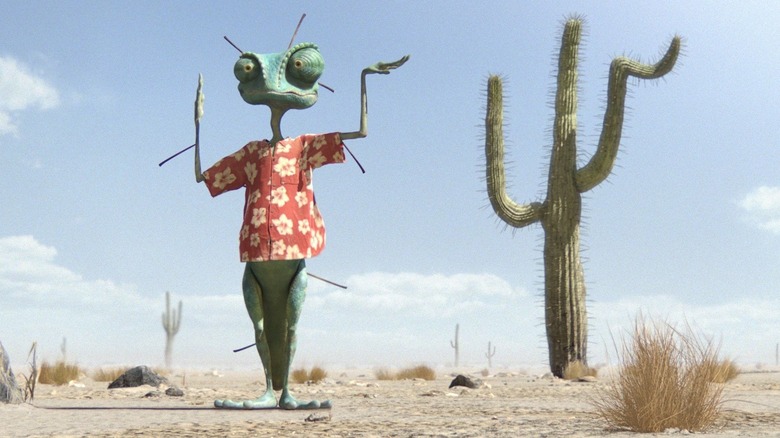Why George Lucas's VFX Company Turned Down James Cameron's Avatar
James Cameron's 2009 ultra-hit "Avatar" seems to be praised and lambasted in equal measure. The film's script is often mocked for its simple dialogue, poor characterization, and embarrassing "going native" conceit. At the same time, though, one cannot fault the film for its dazzling special effects. Cameron utilized the most advanced computers available to visually realize Pandora and the Na'Vi, making them look as realistic as he could. And he succeeded. The effects are legitimately amazing. Say what you will about the story, "Avatar" is one of the slickest movies ever made.
The lead visual effects company on "Avatar" was the New Zealand-based Wētā FX, the studio responsible for the "Lord of the Rings" movies, and many others. The sheer volume of digital effects famously drove prices up on "Avatar," leaving its budget somewhere close to $237 million. As we all know, though, "Avatar" made all that money back and then some. As of this writing, it has made $2.93 billion and is, adjusted for inflation, the second-highest-grossing film of all time.
"Avatar" was a plum gig for Wētā, and it won the FX house an Academy Award. Weirdly, Wētā only got the "Avatar" job after James Cameron was turned down by Industrial Light & Magic, one of America's premier visual effects companies. ILM, as many can tell you, was founded by George Lucas, who has overseen the FX of some of the biggest movies ever, from "Star Wars" to "Sinners." They're so ubiquitous, one can assume that ILM worked on just about any major studio release that has any kind of visual effect at all.
Only ILM didn't do the main work on "Avatar." Which seems odd. Surely ILM would want the whole job on "Avatar." Why did they turn it down? A new episode of the "Industrial Light & Magic" documentary program, covered by article in Dextero, explains that ILM turned James Cameron down because they wanted to take a less risky project. They passed on "Avatar" to work on "Rango."
ILM passed on Avatar to work on Rango
To clarify, ILM did contribute to "Avatar," being brought in at the last minute to help with some clean-up on the film's sci-fi vehicles. They weren't an instrumental part of the pre-production, though, and didn't have anything to do with the motion-capture Na'Vi scenes. They also animated a few scenes of said vehicles firing their weapons at the giant Na'Vi tree during the film's climax.
The Dextero article talked to Janey Lewin, the general manager of ILM, about that fateful day back in 2006 when they were first offered the job on the then-nascent "Avatar" project. ILM was eager to be hired at the time, putting together a few minutes of test footage depicting a few actors into Na'Vi. For the test reel, they transformed Daniel Bess into the Na'Vi Jake Sully role, and Yunjin Kim into Neytiri. At the time, Bess was best known for a regular role on "24," and Kim had starred in several Korean thrillers. Cameron was impressed with ILM's test footage and offered them the job. But they surprisingly turned him down. As for an explanation, Lewin said:
"[W]e turned down 'Avatar' after many, many months of bidding [on] it, and working on a test that got it green-lit. Our leadership at the time, when faced with [it, they said] 'Okay, this could be unachievable, it's so huge.' They were not willing to take that risk. [...] But we had a great relationship with Gore Verbinski, and he had this incredible idea: 'Rango.'"
ILM had worked with Verbinski on his "Pirates of the Caribbean" movies, and the director's idea for a bonkers animated Western with a talking chameleon was intriguing enough to warrant ILM producing their very first animated feature. And, to be fair, "Rango" is an astonishingly weird [positive] film. But "Avatar" was just too big and scary for ILM, and they were more comfortable working on an animated feature than Cameron's mega-flick.
I wonder if they regret it at all. Probably not. They have hits of their own.

